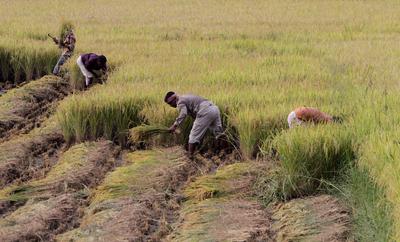By itself, improved business confidence will certainly help spur private investment and boost the growth rate. But it will also put upward pressure on inflation, and, with the Reserve Bank of India’s pledge to keep inflation in check, this will lead to higher interest rates choking off credit and growth.
If the new government wishes to create some breathing room for more growth, then it needs to tackle some of the structural issues contributing to high inflation. Chief among these is India’s distorted food market.
Low or insufficient food output is only one part of the problem — and a small part at that. During the six-year period from 2000 to 2006, when India had its lowest inflation in the last fifty years, the average annual growth in agricultural output had been one of the lowest. This was mainly because of the better food pricing and distribution policies of the government at that time. Growth in the agricultural sector has picked up since then, rising from 2.3 per cent per annum in 2000–2006 to 3.9 per cent in 2006–2011. The sector is estimated to have been growing at an average of 3.7 per cent for the past three years. And yet for the past eight years, inflation in food prices has been in double digits.
Taming inflation is by far the most pressing problem the Modi government faces. In order to bring down inflation, however, piecemeal approaches will not work: what is required is a package of reforms for the food market that is more sweeping than those undertaken in the rest of the economy in the early 1990s.
A recent McKinsey report on India has drawn attention to the distortionary minimum support price (MSP) system in India which enforces crop prices well above cost for certain crops, like wheat and paddy, and lower than cost for others, like pulses, with no price enforced for fruits and vegetables. This hampers much-needed crop diversification in the country.
Indeed, the government uses the MSP system to procure paddy and wheat for the massive food distribution system in the country. This is inappropriate, as the purpose of the MSP is solely to protect farmers from price volatility: not to help procure government food stocks. Ideally, the government should steer clear of determining food prices. Procuring foodstuffs, if it is necessary, should take place at market prices.
Clearly the raising of MSP prices for wheat and paddy at regular intervals by the government, as well as its massive procurement and storage of these crops, is the underlying reason for sustained high inflation in India. The solution is a complete overhaul of the government’s food pricing-procurement-distribution system. We need to move towards a system in which food prices are determined by the market and the government makes cash transfers to allow people to purchase food.
These reforms at the front end of the system must be accompanied by reforms to the ‘back end’: that is, in agricultural input markets. Subsidies to food producers should only take place in the form of cash transfers, not through low or even zero pricing of agricultural inputs like seeds, fertilisers, water and electricity. Subsidies should also only go to marginal and small farmers, not all farmers. Controls on input prices should be relaxed and prices determined by the market.
The third essential component of an agricultural reform package is reform of agricultural marketing. Farmers must be freed from the tyranny of government-regulated markets — called ‘mandis’ — that exploit farmers through intermediaries and their opaque methods of weighing and pricing, commissions, taxes and produce payments. This would require sweeping changes in state governments’ agricultural produce marketing committee regulation, making direct sale of agricultural produce to retailers legal.
Stagflation is hard to escape once it has set in. It is imperative that the new government musters the courage to carry out the very difficult agricultural reforms needed to curb sustained high inflation.
Mathew Joseph is Professor of Economics & Research Mentor at the Rajagiri Centre for Business Studies, Kochi. The views expressed in this article are the author’s personal opinion only.

